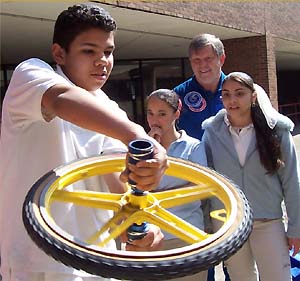About NASA Explorer Schools
This "pipeline" strategic initiative promotes and supports the incorporation of NASA content and programs into science, technology and mathematics curricula in classroom grades 4-9 across the United States. Targeting underserved populations in diverse geographic locations, NASA Explorer Schools will bring together educators, administrators, students and families in sustained involvement with NASA's education programs.
Teams composed of full-time teachers and a school administrator develop and implement a three-year action plan to address local challenges in science, technology and mathematics education. This customized professional development plan will be available based on needs assessments and delivered through on-site school services and via distance-learning networks. Program elements for the NASA Explorer Schools include:
- Summer professional development workshops for teams of teachers and school administrators at the nine NASA Field Centers and the Jet Propulsion Laboratory; one week of intensive training provides opportunities to begin integration of NASA content into existing school curricula and culminates in the development and implementation of action plans to meet local education challenges.
- Ongoing research-based professional development during the school year, in collaboration with organizational partners and other federal agencies; this activity, coordinated by a network of teacher leaders and trainers, includes NASA aerospace education specialists, Space Grant consortia, educator resource centers and NASA Education networks.
 | | Image above: Three students and NASA astronaut Roger Crouch experiment with a bicycle wheel gyroscope. Credit: NASA |
- Student programs that provide opportunities for active participation in research, problem solving and design challenges relating to NASA's missions and involve students in science, technology, engineering and mathematics explorations to encourage the use of scientific tools and methods; challenges will be grade-specific, supporting national and state standards. In addition, in-flight opportunities and competitions will provide access to unique NASA resources and personnel.
- The NASA Explorer Schools Web site includes NASA resources; science, technology and mathematics investigations; collaborative tools; and opportunities to share student and school program results.
- A grant to each school will support the purchase of technology tools, online services and inservice support for the integration of technology applications to engage students in science and mathematics investigations.
- Family involvement in student educational growth, achievement and career exploration is the responsibility of the NES teams locally for school and home experiences developed in cooperation with NASA assets; online opportunities will be available through the NASA Explorer Schools Web site.
Competitive applications and selection of the NES teams occur each spring. Up to 50 teams will be added each year, for a maximum total of 150 teams.
|
|
|
|

